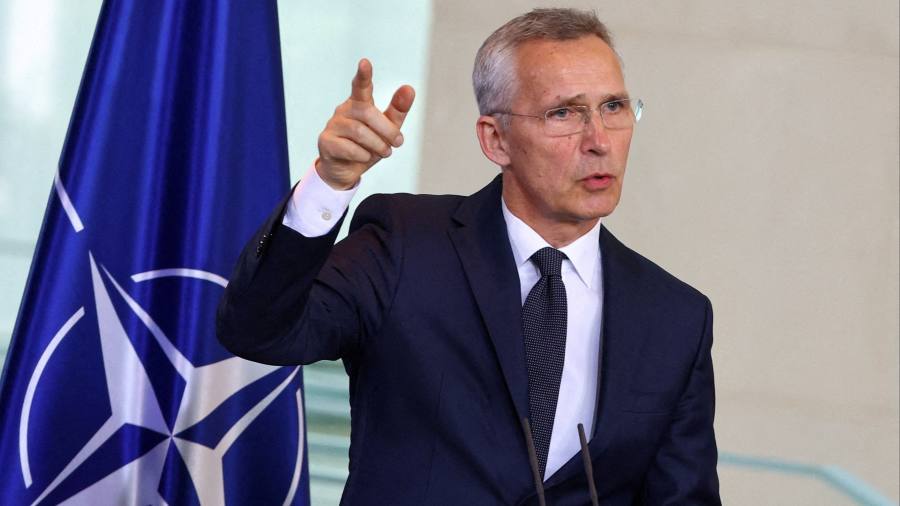Receive free Nato updates
We’ll send you a myFT Daily Digest email rounding up the latest Nato news every morning.
Nato has extended Jens Stoltenberg’s term as secretary-general of the military alliance by another year, as allies decided against a change in leadership amid the war in Ukraine.
Stoltenberg, a former Norwegian prime minister who has led Nato since October 2014, was due to step down this autumn, but the alliance’s 31 members settled on another extension to his term last month after alternative candidates failed to win support.
The 64-year-old, whose term at the helm of the US-led military alliance has already been extended three times, has won plaudits for his calm leadership and ability to find consensus among allies, especially since Russia’s full-scale invasion of Ukraine last February brought war to Nato’s borders.
“I am honoured by the decision of Nato allies to extend my term as secretary-general,” Stoltenberg said in a statement. “The transatlantic bond between Europe and North America has ensured our freedom and security for nearly 75 years, and in a more dangerous world, our great alliance is more important than ever.”
Stoltenberg’s priorities include a wide-ranging overhaul of Nato’s strategic posture in eastern Europe, and a return to the alliance’s core task of deterring and defending against a possible Russian attack on an ally, after a generation of “out of area” operations in countries such as Afghanistan.
He must also chart the alliance’s approach to Asia, collaborating with western allies such as Japan and South Korea as they fret about rising Chinese military might. Some Nato members such as France have urged the alliance to remain focused on Europe.
UK prime minister Rishi Sunak said he was “looking forward to continuing” to work with Stoltenberg.
“Under [Stoltenberg]’s leadership, Nato has evolved to meet new threats, continued to protect our people and has been steadfast in support of Ukraine,” he said.
Annalena Baerbock, Germany’s foreign minister, congratulated Stoltenberg, saying that his leadership had been “key” to the strength of the alliance.
Stoltenberg had previously been evasive about a potential extension, saying he was “not seeking” to remain in post after October 1.
The extension, which will be formally endorsed by Nato leaders at a summit next week, comes after alternatives such as Danish prime minister Mette Frederiksen and UK defence secretary Ben Wallace failed to win unanimous support.
Many allies had suggested it was time for the alliance to be led by a woman for the first time, while others argued an eastern European candidate would show Nato’s commitment to defending its eastern flank.
Stoltenberg has spent much of the past 18 months treading a fine line between urging allies to provide military support to Ukraine and avoiding a direct conflict between nuclear-armed Moscow and Nato.
Dubbed the “Trump whisperer” for his ability to manage former US president Donald Trump’s at times antagonistic approach to Nato allies, Stoltenberg has also taken a personal role in so far unsuccessful attempts to convince Turkey to drop its veto on Sweden’s accession to the alliance.
Montenegro, North Macedonia and Finland have joined the alliance under his tenure.
Additional reporting by Laura Pitel in Berlin
This article has been amended to correct Jens Stoltenberg’s age.
Read the full article here




